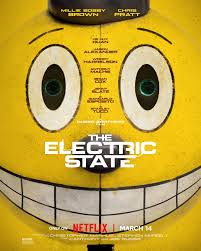Understanding ‘The Electric State’ and Its Significance

Introduction
The concept of ‘The Electric State’ has emerged as a critical topic in contemporary discussions about technology and its impact on society. Coined by respected analyst and author, the term encapsulates the profound shifts occurring in our digital age, especially in how we interact with technology and each other. Understanding this concept is important as it not only influences cultural narratives but also informs how policymakers and educators prepare for future challenges.
The Current Landscape
As of late 2023, the ramifications of the Electric State are evident across various sectors. From the meteoric rise of artificial intelligence to the omnipresence of social media, our world is increasingly dominated by electrical and digital interfaces. A recent report by the International Telecommunication Union indicates that over 5 billion people are online, illustrating the vast reach and influence of digital connectivity. This growth has led to debates about digital privacy, the ethics of AI, and the socio-economic divides that persist in tech access.
Technological Advancements
Recent advancements further exemplify the Electric State’s significance. Innovations such as virtual reality, augmented reality, and the Internet of Things (IoT) are changing the fabric of daily life, allowing for unprecedented interactions and experiences. For instance, AR applications are being employed in sectors ranging from education to architecture, enhancing engagement and understanding. A report from Statista projects that the AR and VR market could reach $300 billion by 2024, showcasing how quickly these technologies are being adopted and their transformative potential.
Cultural Impact
The cultural implications of the Electric State are also profound. Artists, filmmakers, and creators are increasingly using technology as a medium for expression. Movies and series that explore futuristic themes, such as the blending of human experience with AI, reflect the societal anxieties and hopes surrounding technological change. This cultural shift prompts vital discussions about the ethics of tech and the future of human identity, making the Electric State a crucial lens through which to view contemporary art and literature.
Conclusion
As we navigate the complexities of the Electric State, it is clear that awareness and understanding are essential for future progress. The intertwining of technology and daily life necessitates thoughtful engagement from all sectors, including education, industry, and government. As digital literacy becomes a fundamental skill, those who can effectively harness the power of technology will shape a cohesive society adaptable to emerging challenges. In this new era, embracing the Electric State is not just about technological advancement but about fostering a future that values inclusivity, innovation, and ethical responsibility.









